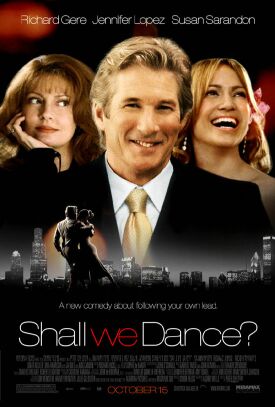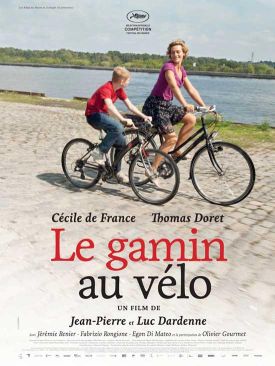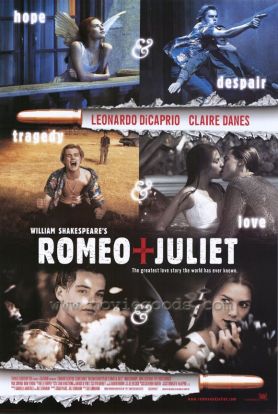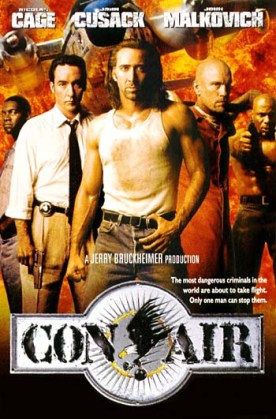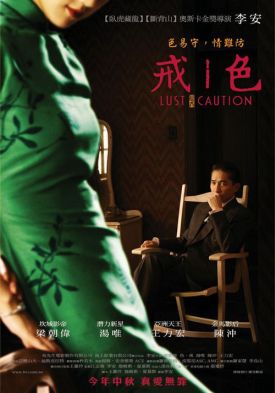Shall We Dance?
It’s not exactly arcane wisdom, though for the frequency with which it is ignored by Hollywood, you would think it were, but remakes are almost always a bad idea. Remakes of foreign films are even less often successful and remakes of good foreign films are an invitation to divine punishment. And yet they go on re-making them. The latest example is Peter Chelsom’s version of Masayuki Suo’s wonderful Japanese film, Shall We Dance? of 1996. Chelsom (Hear My Song, Funny Bones, The Mighty) appears to have taken the precaution of getting Mr Suo himself as co-adaptor of his own original screenplay and even adding a reassurance to the audience at the head of the press notes reading: “I was delighted that the remake so successfully addressed the same issues faced by the characters in my film. . .Seeing the remake reconfirmed to me that these are universal themes which confirm our commonality and surpass cultural differences.”
Well, up to a point. But the movie still doesn’t work. The reasons are largely cultural. The trouble is that the original depended far more than Mr Suo suggests here on the Japanese cultural context where public touching between the sexes and therefore ballroom-style dancing is still faintly indecent. That is the reason that his salaryman hero keeps his dance lessons hidden from his wife. Chelsom’s version, a Chicago wills-and-trusts lawyer called John Clark (Richard Gere), has no such reason for secrecy, and yet he keeps his dancing a secret anyway. It is hinted that he was originally attracted by Paulina (Jennifer Lopez), the beautiful dance teacher he glimpsed at the window of her studio from his commuter train, because he desired her carnally — but that he then sublimated those feelings by falling in love with the dancing.
Sure he did. But even if so it’s not enough to explain his continuing to keep the secret from his wife (Susan Sarandon), with whom he otherwise appears to have a close and loving relationship, after he gets hooked on the dancing and even enters a competition. She hires a detective (Richard Jenkins) to follow him and is amazed — as well she might be — to find that he is going dancing instead of having an affair. She has no more clue than we do why he would do it secretly. When their daughter suggests that dad should teach mom to dance too instead of skulking off on his own every Wednesday night, the idea is treated as an epiphany. Gosh! Who’d ever have thought of that? Likewise, when finally called upon to give an account of himself, all he can say to explain his behavior is to say: “I felt ashamed for wanting to be happier when we have so much”
Huh? Is it imaginable that anybody, I mean any real person, could ever have uttered such a sentence as an excuse for taking dancing lessons? I don’t think so. The idea that a lawyer and man of the world should have seen a few dance lessons as adding more than he deserved to his sum of worldly happiness is just ludicrous.
It’s true that many movie-goers will be happy to treat all such objections as minor irritations. All right, they will say, so the motivations of the characters are a little obscure, even silly. Still there are lots of things to like about the film. And they are right. The dancing scenes are mostly enjoyable to watch and at times thrilling, and there are several well-drawn characters, especially Linc (Stanley Tucci), a colleague from Clark’s law office who also keeps his dancing a secret but has a better reason for doing so in that he is already something of a figure of fun to the rest of the office, and Bobbie (Lisa Ann Walter), a feisty dame who rather terrifies the men around her but who ends up in the big competition as partner to both Clark and Linc. Miss Sarandon is always watchable too, but I’m afraid that Miss Lopez’s broken blossom, the dance champion who has been nursing a broken heart ever since splitting up with her long-time partner, falls flat as a concept and a character if not as a dancer.
There is some attempt to bring her sad personal history to bear on her teaching John Clark the tango, which she describes as “the vertical expression of a horizontal wish.” At the conclusion of the dance he is meant to feel “like she has ruined you for life,” but it only reminds us of the theatricality with which she has been acting out her own ruin. And of course this doesn’t last. It’s like one of those “lifetime bans” in pro football that lasts about three weeks. The forced uplift also comes into play when Miss Mitzi, the dance studio’s proprietor (Anita Gillette) appears to give up nipping at her little silver flask after each dance, perhaps because she’s been cured of alcoholism by John’s inspirational dancing.
Such moments bring us back to what I take to be the fakery of the central situation. Chelsom has made the classic Hollywood mistake of putting his uplift before the basic mise-en-scène that is meant to create it. In a way this is understandable because Suo’s original was done with such a light touch that it seemed almost to have conjured its effects out of thin air. But a closer look reveals that he also did the hard work of making us believe in the relationship between the secret dancer and his wife. That is the task that proves too much for the remake.
Discover more from James Bowman
Subscribe to get the latest posts to your email.

